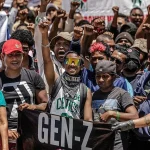By Aisha Muhammad Magaji
The tragic death of ARISE TV anchor Somtochukwu Maduagwu, known as “Sommie,” has sparked widespread outrage following reports that she was denied urgent medical care after a violent robbery at her Abuja residence. Her colleagues have condemned the hospital’s actions, highlighting systemic failures in Nigeria’s emergency healthcare system.
On the night of September 29, 2025, over a dozen armed robbers stormed the 16-apartment complex in Katampe, Abuja, where Maduagwu resided. In a desperate attempt to escape, she jumped from her window, sustaining severe injuries. She was rushed to Maitama General Hospital but was reportedly denied immediate treatment because she could not provide identification documents. By the time her identification was presented, she had already been declared dead.
During the September 30 edition of The Morning Show, anchors Ojy Okpe and Reuben Abati expressed their outrage over the hospital’s conduct. Okpe described the incident as a “tragic, tragic” event, emphasizing that Maduagwu’s life could have been saved had she received timely medical attention. Abati condemned the hospital’s actions as a violation of medical ethics and Nigerian law, stating that healthcare providers have an obligation to treat all patients in life-threatening situations, regardless of identification status.
The Federal Capital Territory (FCT) Police Command has initiated a comprehensive investigation into the circumstances surrounding Maduagwu’s death. The Commissioner of Police, Ajao Adewale, described the incident as a “cruel and senseless act” and assured that efforts are underway to apprehend those responsible.
Public reaction has been swift, with many Nigerians expressing their anger over the hospital’s negligence. The incident has reignited debates about the quality and accessibility of emergency healthcare services in the country.
Somtochukwu Maduagwu’s untimely death serves as a stark reminder of the critical need for reforms in Nigeria’s healthcare system, particularly concerning emergency medical protocols. As investigations continue, there is a collective call for accountability and systemic changes to prevent such tragedies in the future.








